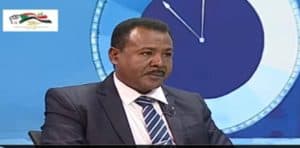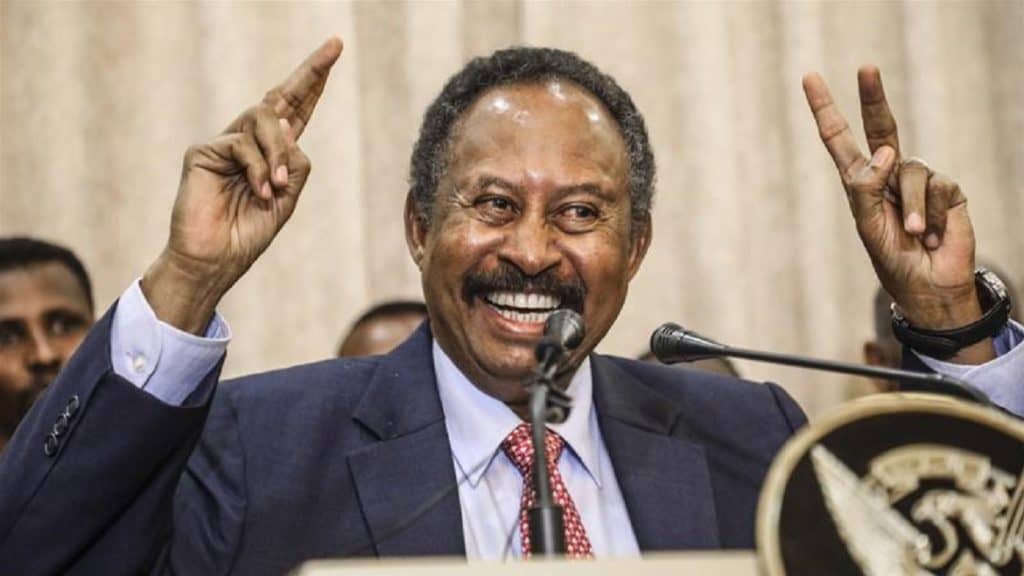By Denis Korkodinov – Interview with Rashid Muhammad Ibragim al-Rashid
In the sphere of aggravation of the Libyan crisis, due to the intensification of Turkish military participation in the defense of the Government of the National Accord of Libya, Sudan has become the object of close attention from the international community. This was done after Turkish President Recep Erdogan openly accused Khartoum, along with Moscow, of supporting the Libyan National Army under the command of Khalifa Haftar. In addition, due to a recent attempt at a military insurrection in Sudan, there was a risk of another military coup, which could “nullify” all the agreements reached between the countries of the international community and the political regime of Hamidati in Khartoum.
Especially for World Geostrategic Insights, we talked about this with Sudanese political expert, Sudan’s national security specialist, Rashid Muhammad Ibragim al-Rashid.

1. On January 14, 2020, an attempt was made in Sudan to launch another military insurrection. It was organized by employees of the Operational Directorate of the General Intelligence Service of Sudan, who began firing after the decision of the central government to reform the department. However, the international community is very doubtful about the official version of what happened. So, the formal reason for the rebellion of Sudanese scouts – the reduction in wages, raises questions. In addition, tanks were sent to suppress the riot of several intelligence officers of the country and a state of emergency was introduced in Sudan. The airspace over Sudan was closed during a special operation to neutralize the riot, which indicates a huge threat to national security. What really happened in Sudan on January 14, 2020? Is it fair to believe that the airspace over Sudan was closed due to fears of outsider support for the rebels? Why was it decided to abolish the Operations Directorate of the General Intelligence Service of Sudan? Which organizations currently carry out the operational management responsibilities of the Sudan General Intelligence Service?
RASHID MUHAMMAD IBRAGIM AL-RASHID: On January 14, 2020, a limited uprising of 50 employees out of 11,737 officers and members of the Operations Division of the General Intelligence Service took place in Sudan. The uprising was caused by the non-payment of wages to soldiers. This action had no political implications. In other words, it was not a protest against the state, but was a manifestation of dissatisfaction of the military personnel solely with their financial situation. Moreover, this event has become unprecedented in the history of Sudanese intelligence, which is why it was of particular importance. The fact is that the Sudan’s General Intelligence Service’s Operations Division is a special elite unit whose employees have extensive experience in participating in hostilities and also have the skills to counter terrorist organizations both within the country and abroad. They have a huge arsenal of almost all types of small arms and heavy weapons. For this reason, there were serious concerns about the true intentions of the participants in this uprising.
In turn, the fact that the uprising was quickly neutralized indicates that it had as its goal the attraction of public attention. The rioters had no reason to use small arms while they could use tanks and aircraft if their protest was aimed at overthrowing the power in Sudan. For the same reason, the attitude of the participants in the uprising of the former director of the Sudan’s National Intelligence and Security Service, Major General Salah Abdullah Ghosh, who was the architect of the idea of restoring power to the ousted president of Sudan, Omar al-Bashir, was excluded. This explains why the uprising of the Operations Division of the General Intelligence Service was poorly organized.
There is another trend of analysis, according to which the dissolution of the Operations Directorate forces was an organized and anticipated action for some countries to use Sudanese soldiers in conflict zones: to fight the forces of Khalifa Haftar in Libya or the Ansar Allah movement in Yemen.
The closure of Sudan’s airspace was an emergency and precaution because the rebellion took place in the immediate vicinity of Khartoum International Airport. Sudanese intelligence operations personnel have anti-aircraft mounts that could be used against civil aviation. And, as I said, we did not know about the true intentions of the rebel officers. For this reason, we were obliged to provide all options for the development of events and exclude any danger to the state and ordinary people.
The decision to abolish the Operations Division, as well as the Sudanese intelligence information collection and analysis department, was triggered by new political trends in Sudan to deprive supporters of ousted President Omar al-Bashir of military tools to restore the previous regime.
Currently, the functions of the Operations Division are distributed between other units of the intelligence apparatus and the Provisional Transitional Government. However, this does not indicate a weakening of the national security of Sudan, since the morale and defense capability of the state remains at a high level.
2. Turkish President Recep Erdogan, arguing the right of his country to military intervention in Libyan affairs, said that Sudan is actively involved in the Libyan conflict. Confirming this, the Turkish leader notes that Sudan deliberately limited its military contingent in Yemen in order to transfer it to Libya. Can one agree with Recep Erdogan? Are Sudanese soldiers taking part in Libya on the side of the Libyan National Army? How are Turkish-Sudanese relations currently being built?
RASHID MUHAMMAD IBRAGIM AL-RASHID: Turkish President Recep Erdogan’s statement should be seen in the context of the information war. Thus, he wanted to give impetus to Turkish intervention in Libya, which is aimed at the historical interests of Turkey in the eastern Mediterranean. In addition, Recep Erdodan, while stating Sudanese participation in the Libyan theater of war, expressed the view of the United Arab Emirates, which are putting pressure on Sudan, demanding that its troops begin supporting the forces of Khalifa Haftar. But so far this has not been possible, since the military presence of Sudan in Libya may complicate the position of the Vice President of the Sudanese Transitional Council, Lieutenant General Mohammed Hamdan Dagalo (Hamidati) both domestically and internationally.
For this reason, Sudanese soldiers are not participating in the concept of military presence to support the Libyan National Army or the Al-Vefak government. However, there are joint Sudanese-Libyan forces that act in accordance with the military protocol signed between Tripoli and Khartoum in order to control borders and combat illegal immigration.
Currently, Turkish-Sudanese relations are experiencing a period of stagnation, since the ideology of the new political system in Sudan has allowed weakening of bilateral relations. And now the transitional government is working on a revision of agreements with the Turkish side, especially regarding the port of Suakin and the Red Sea. Therefore, relations are expected to deteriorate in favor of the UAE – Saudi Arabia axis.
3. Recently, Sudan, Ethiopia and Egypt, through the mediation of the United States, reached an agreement on the controversial project of the Hedashi reservoir on the Blue Nile. However, experts believe that the dispute between the countries is still relevant and has become hidden. At the same time, Egypt’s clear desire to launch a military campaign in Libya could weaken Cairo’s position on the controversial reservoir project. So, according to Egyptian sources, Sudan and Ethiopia can take advantage of the Libyan crisis and begin military action against Egypt. Is such a statement true? Is it possible to consider that the dispute between Sudan, Ethiopia and Egypt regarding the Hedashi reservoir on the Blue Nile is completely settled?
RASHID MUHAMMAD IBRAGIM AL-RASHID: What is happening with the Blue Nile dam file is the result of agreements that transcended the political dispute between Ethiopia, Sudan and Egypt, and laid the foundation for a discussion of technical issues related to the dam filling period and ways of its operation.
I expect that American mediation will lead to a constructive solution to these issues. Washington has the opportunity to motivate each side of the existing dispute over the dam.
Meanwhile, there is still a risk of a clash between the Ethiopian strategy based on the dam system around the Blue Nile and the Egyptian strategy based on maintaining the conquests of Egypt. However, the implementation of the military scenario is unlikely, since the internal situation in the three countries suffering from strategic influence does not encourage any limited or widespread military strike.
4. On January 21, 2020, Sudanese Prime Minister Abdullah Hamdok stated that there was no foreign currency in the country to protect the value of the pound and that there was a “structural deficit”. Does this mean that Sudan may face hyperinflation in 2020, as the Sudanese pound is virtually unsecured? How is the Transitional Government of Sudan planning to close the “structural deficit” of foreign exchange? Does Sudan plan to attract foreign investors, including Russia and China, in order to overcome the economic crisis?
RASHID MUHAMMAD IBRAGIM AL-RASHID: The economic situation in Sudan is suffering from many distortions, especially the lack of a strategic vision, pent-up inflation and control over the deterioration of the pound against other currencies. The approach to overcoming the crisis is dominated by the political rather than the technical side, which removes the roots of the economic crisis, represented by the lack of a production process in the sectors of agriculture, industry, oil, mining, services and communications.
The problem now is that politics does not serve the economy. Therefore, the decline in economic indicators remains the dominant factor in the Sudanese scene.
I do not expect that the policy of attracting foreign investment will be present in the mentality of the transitional government, because the transitional period in Sudan is short (only 2-3 years), while large strategic investments need a longer time. In addition, political instability and economic performance are not attractive to foreign investors.
Sudan’s foreign policy may open to Russia and China, but in the next election period







